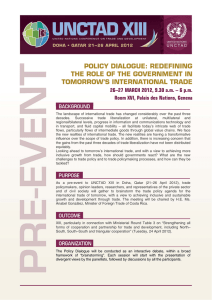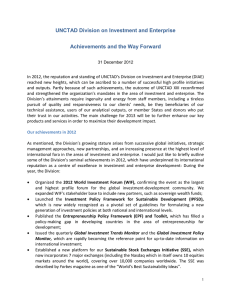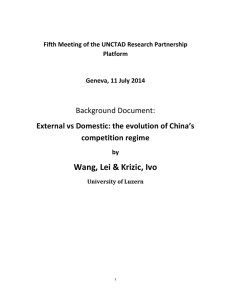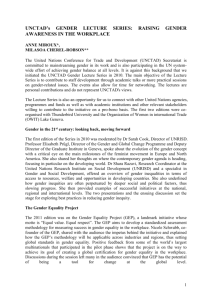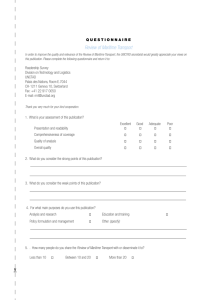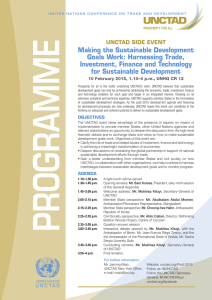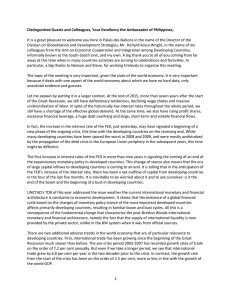DRAFT CSO STATEMENT TO THE PRESS – DOHA, 22ND APRIL
advertisement
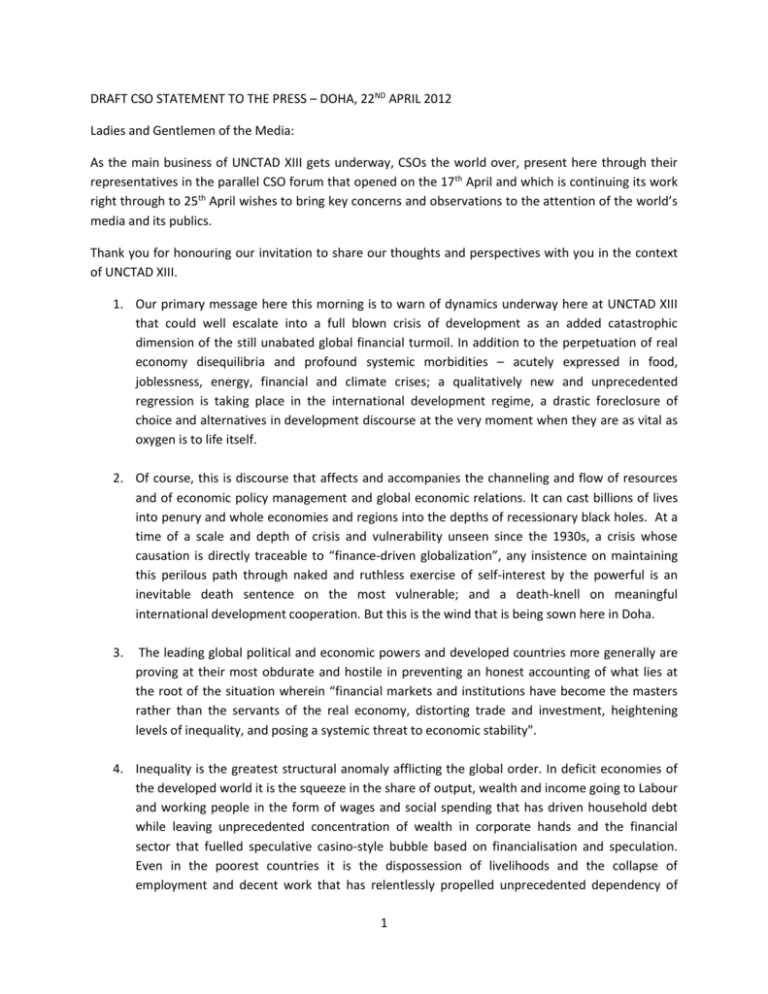
DRAFT CSO STATEMENT TO THE PRESS – DOHA, 22ND APRIL 2012 Ladies and Gentlemen of the Media: As the main business of UNCTAD XIII gets underway, CSOs the world over, present here through their representatives in the parallel CSO forum that opened on the 17th April and which is continuing its work right through to 25th April wishes to bring key concerns and observations to the attention of the world’s media and its publics. Thank you for honouring our invitation to share our thoughts and perspectives with you in the context of UNCTAD XIII. 1. Our primary message here this morning is to warn of dynamics underway here at UNCTAD XIII that could well escalate into a full blown crisis of development as an added catastrophic dimension of the still unabated global financial turmoil. In addition to the perpetuation of real economy disequilibria and profound systemic morbidities – acutely expressed in food, joblessness, energy, financial and climate crises; a qualitatively new and unprecedented regression is taking place in the international development regime, a drastic foreclosure of choice and alternatives in development discourse at the very moment when they are as vital as oxygen is to life itself. 2. Of course, this is discourse that affects and accompanies the channeling and flow of resources and of economic policy management and global economic relations. It can cast billions of lives into penury and whole economies and regions into the depths of recessionary black holes. At a time of a scale and depth of crisis and vulnerability unseen since the 1930s, a crisis whose causation is directly traceable to “finance-driven globalization”, any insistence on maintaining this perilous path through naked and ruthless exercise of self-interest by the powerful is an inevitable death sentence on the most vulnerable; and a death-knell on meaningful international development cooperation. But this is the wind that is being sown here in Doha. 3. The leading global political and economic powers and developed countries more generally are proving at their most obdurate and hostile in preventing an honest accounting of what lies at the root of the situation wherein “financial markets and institutions have become the masters rather than the servants of the real economy, distorting trade and investment, heightening levels of inequality, and posing a systemic threat to economic stability". 4. Inequality is the greatest structural anomaly afflicting the global order. In deficit economies of the developed world it is the squeeze in the share of output, wealth and income going to Labour and working people in the form of wages and social spending that has driven household debt while leaving unprecedented concentration of wealth in corporate hands and the financial sector that fuelled speculative casino-style bubble based on financialisation and speculation. Even in the poorest countries it is the dispossession of livelihoods and the collapse of employment and decent work that has relentlessly propelled unprecedented dependency of 1 their main economic sectors on international trade, credit and the financial markets that have engulfed them directly into their turbulent ambit or indirectly assailed them in the backwash of their ever-widening vortex of volatile ebbs and flows. In other so-called surplus countries, their insecure populations must save and self-insure against the ever-present possibility of economic disaster. All told, these add up to a deep deficit in global demand. And most telling of all, at the systemic level, is the chasm between rich and poor regions, an entrenchment of disparity and inequality that has no precedence in all of history. This is the greatest fault line of all. 5. Yet, in the face of the entrenchment and intransigence of the masters of the universe, the sense that that system must be repaired is in inverse proportion to the actual prospect of doing so. The piecemeal reforms and palliatives on offer only reveal the depths of policy paralysis of the political leadership establishment at the global level. Except when, vampire-like, they must squeeze the life of people to prop their absolutist private property system. The Euro zone crisis, currently the eye-of-the-storm, daily reveals the toll and destructiveness of the insatiable dictatorship of finance over peoples and economies already witnessed across the Atlantic. Further South, in Africa and Asia, grim economic survival now merges with dismal ecological existence as the early effects of major climate warming wreak disaster and portend doom for hundreds of millions in the here and now. But those who would throw trillions to bulge their banks balances cannot bother with carrying out their basic obligations, those known measures that will cool down and reverse the climate change bubbling towards catastrophe. Quite literally, they are fiddling while it burns. 6. To be sure, that the crisis is human-made and engendered specifically from the actions, choices, goals, power and prescriptions of dominant economic and political interests within these heartlands was never going to be a palatable truth. To the degree that it signals the epic failure of their system, and exacts inhuman costs shoved onto the shoulders of the vulnerable who also have no culpability; this now-clichéd truth also calls forth a thorough-going re-ordering of economic relations and the management and control of economic resources and decisionmaking. But this not the agenda at UNCTAD XIII. 7. What is on the agenda is whether or not UNCTAD will be hamstrung from dissecting and flagging problems and solutions to the fact that: people everywhere have paid and will continue to pay for the crisis as long as finance is not subordinated to the real economy and to inclusive and sustainable development; that the decisions and efforts of the leading powers has not resolved matters; that access to food for increasing numbers of the world’s populations is becoming ever more endangered; that energy inequality is being exacerbated by the inflationary pressures and volatility of energy markets and access to renewable energy; that the climate crisis escalates apace with the perpetuation of a growth paradigm dependent on uncontrolled fossil-fuel consumption and rising greenhouse gas emissions (as attested to by the frequency of natural disasters and extreme weather events that are already manifest everywhere and in particular in vulnerable regions of the global South). 2 8. The attack on UNCTAD is therefore of a piece with a long-term attack on working people and the poor the world over. More immediately it is an attack on the developing world and her peoples in particular; and, in equal measure, on the legitimacy, viability and relevance of a system of more equal and participatory global governance and international coordination just when such is needed as never before to work towards the possibility of solutions and their actualization in our common and collective global interests. The strengthening and refurbishment of nodal governance institutions in the Washington-led elite consensus requires this retrograde dismantling of those like UNCTAD that still retain their character as outposts of alternatives and the ideal of participation and genuine sharing. It is against this assault on development and democracy that we join hands as citizens from all corners of the earth to raise our voices and our banners. Thank you. We will now take questions. 3



